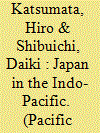| Srl | Item |
| 1 |
ID:
154437


|
|
|
|
|
| Summary/Abstract |
Leftist political parties and labor unions that had stood at the forefront of the collective effort to protect Article 9 until the early 1990s have stepped back to some extent as they have shrunk and fragmented. Instead, advocacy groups whose influence is often enhanced by ‘leftist elites’ have now seemed to come more to the fore, thereby raising certain questions: What roles do the leftist elites play in those groups? How are such groups organized? Who exactly are the leftist elites? This article intends to address questions regarding the leftist elites, as well as the organization and development of these advocacy groups, in particular the Article 9 Association.
|
|
|
|
|
|
|
|
|
|
|
|
|
|
|
|
| 2 |
ID:
156252


|
|
|
|
|
| Summary/Abstract |
This study has focused on the organizational and structural aspects of Nippon Kaigi, a major rightist lobbying group in Japan. It argues that Nippon Kaigi may not be that powerful despite the group’s influential outlook. By examining the elements of the organization and their relationships with each other, this study observes that Nippon Kaigi as a whole may not be very cohesive.
|
|
|
|
|
|
|
|
|
|
|
|
|
|
|
|
| 3 |
ID:
190665


|
|
|
|
|
| Summary/Abstract |
Although Japan is commonly regarded as a strong proponent of the existing liberal international order championed by the US in the Indo-Pacific, sometimes it has been half-hearted in opposing a Sino-centric order and been rather supportive of Chinese diplomacy. In particular, it has to some degree supported the Belt and Road Initiative (BRI) implemented by Beijing, effectively offered its endorsement to the international legitimacy of the Chinese Communist Party (CCP) without problematizing human rights issues, and severely restricted the enhancement of its own defense capabilities. These policies have been shaped by pro-China individuals and groups who hold privileged positions inside the government, and their privileged positions have been determined by haphazard domestic political factors which have little to do with Sino-Japanese relations. This means that, although on the surface Japan may seem to have rationally calculated its international strategic interests and implemented hedging as a coherent strategy amid Sino-US rivalries, its implementation of what seems to be a hedging strategy has actually been incidental. Its policy has turned out to resemble what has been regarded by International Relations (IR) theorists as a hedging strategy, due to haphazard domestic political factors.
|
|
|
|
|
|
|
|
|
|
|
|
|
|
|
|
| 4 |
ID:
167166


|
|
|
|
|
| Summary/Abstract |
This article observes that the cycle of violent political extremism that began in Japan’s postwar period did not last long beyond the mid-1990s. In view of the situation, this article intends to (1) give an overview of the issue, (2) discuss why the frequency and degree of political violence declined, and (3) investigate current trends in Japanese political extremism, as it still appears to exist if we define extremism as more than physically violent behaviors. This article argues that violent extremism as a tactic may have found it difficult to outlive the period of the “developmental state” of Japan, while the era of “civil society” in Japan that followed perhaps rendered ideologically motivated violence irrelevant. This article also argues that, today, acts that can be counted as extremism have morphed into occasions where activists have grievously offended the feelings of the targeted population, thereby gaining notoriety and publicity.
|
|
|
|
|
|
|
|
|
|
|
|
|
|
|
|
| 5 |
ID:
061894


|
|
|
|
|
| Publication |
Mar-Apr 2005.
|
|
|
|
|
|
|
|
|
|
|
|
|
|
|
|
| 6 |
ID:
141492


|
|
|
|
|
| Summary/Abstract |
What factors could be behind the recent emergence of xenophobic and racist movements in Japan? What kind of people are advancing these movements? What is their interest in doing so? This article addresses these questions.
|
|
|
|
|
|
|
|
|
|
|
|
|
|
|
|